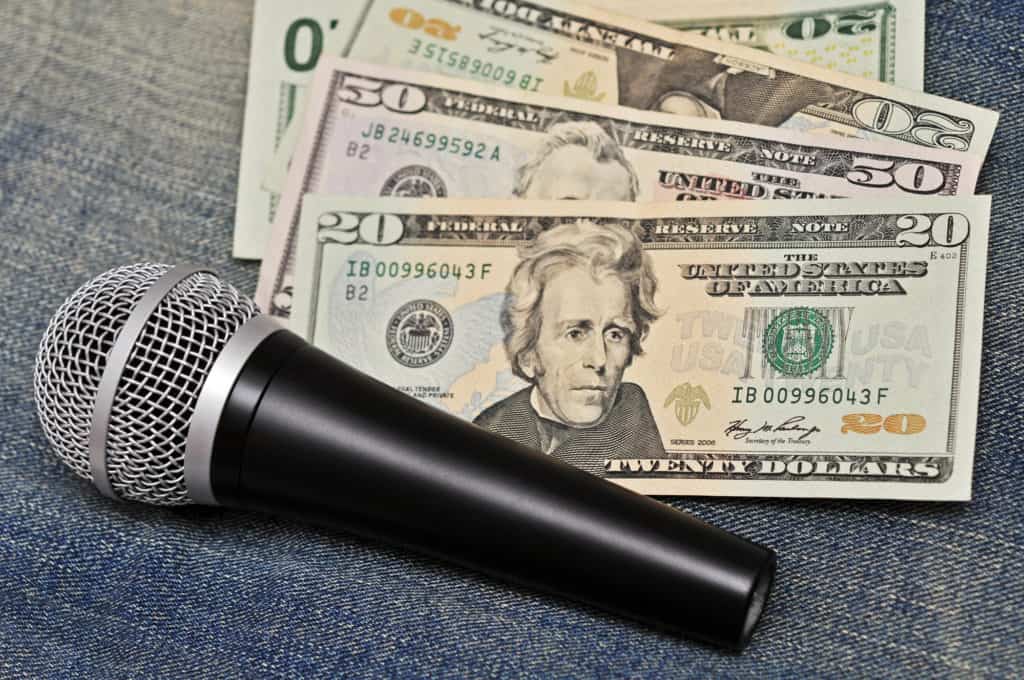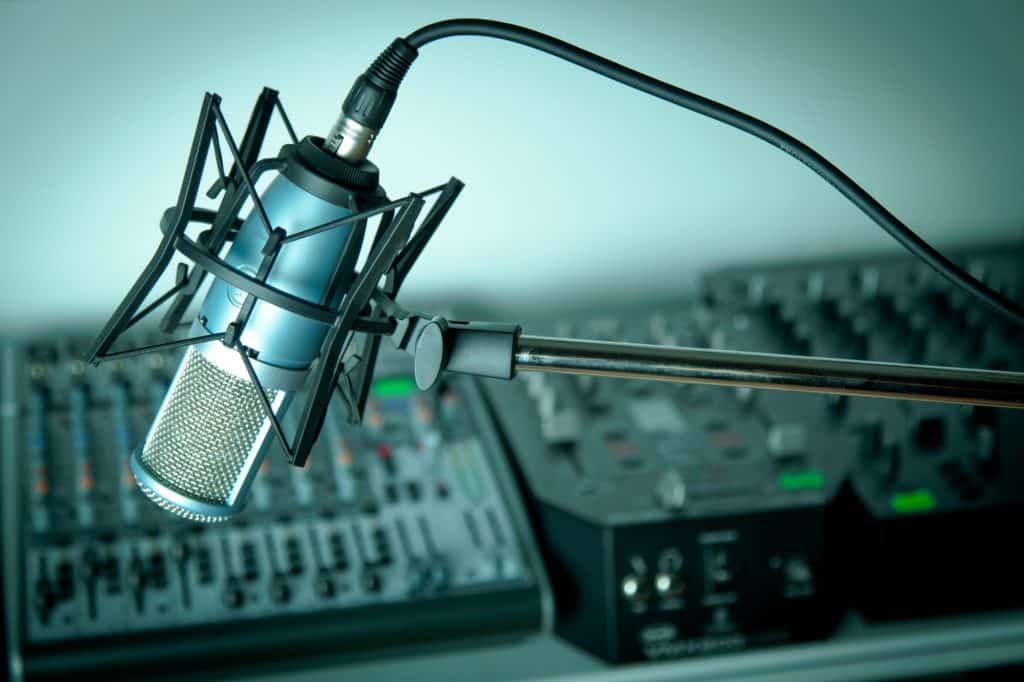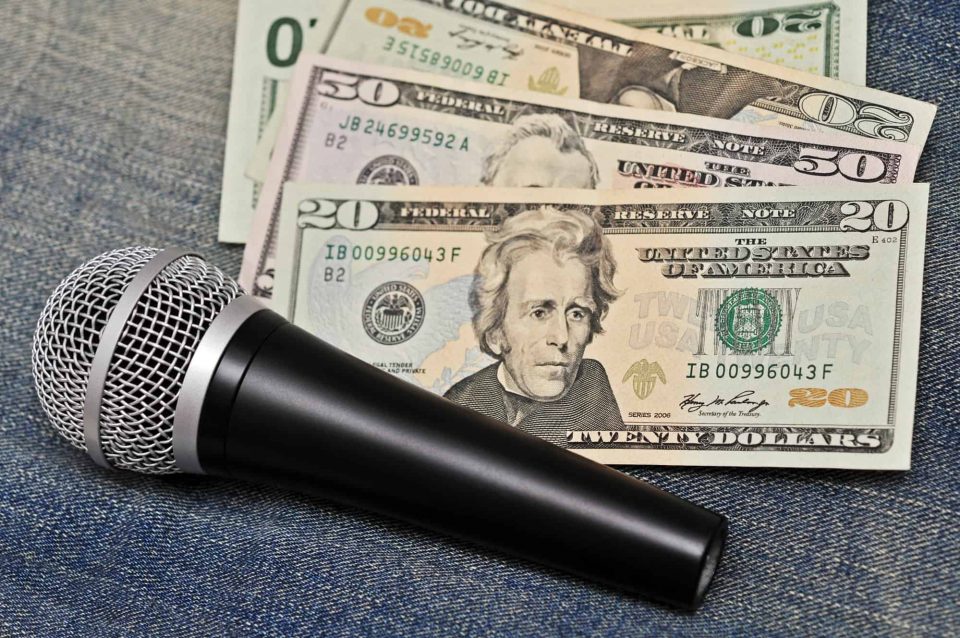Knowing the estimated cost of creating your audiobook will help you determine your budget or whether you should even create your audiobook. If your ebook and paperback book are already selling well, then creating an audiobook is a great way to reach new fans.
The cost to make a 6.5-hour audiobook will be about $1700. This includes the cost of the cover art, ISBN, narration, and production. Production refers to the editing, proofing, and mastering of the audio files.
The table below lists all of the elements that go into creating a 6.5-hour audiobook:
| Description | Cost |
| Audiobook Cover | $100 – $1000 |
| Audiobook ISBN (optional) | $125 |
| Narrator Options: Professional Narrator Author (Home Studio) Author & Producer | Narration Options: Professional Narrator: $1300* Author (Home Studio): $202** Author & Producer: $3023*** |
| Total for typical costs: | $300 cover + $125 ISBN + $1300 Narration = $1725 |
* According to Reedsy, the average book is between 50,000 – 70,000 words. If I use an average of 60,000 words, then a completed audiobook would be about 6.5 hours. Note that this conversion is based on the Audible/ACX average of 9300 spoken words per hour. This value assumes a pay rate of $200 per-finished-hour (PFH). The finished hour refers to the length of the completed audiobook. Pay-For-Production. See the Professional Narrator section below to learn more.
** This is an estimate for recording equipment for home studio, including the sound dampening blankets, microphone, headphones, software for editing and mastering. If the author already has this equipment, then the cost is $0.
*** Assuming the author works with a producer in a professional studio. See the Author and Producer section to learn how this rate is calculated.

In the rest of the article, I go into more detail about how to purchase audiobook cover art, ISBN, and which options to use for narration.
Audiobook Cover Work
Audiobooks like paperback and ebooks all need covers. This is the very first thing your customer’s will see in the audiobook store. It must get their attention, or they will keep scrolling past your audiobook.
Usually, the graphic designer who generated the paperback and ebook covers will create a cover for your audiobook. Keep in mind that the cover sizes for audiobooks, paperback, and ebooks are all different. Don’t try to stretch the ebook cover to the size of the audiobook.
The purpose of the cover is to get a listener to click on your cover and read the summary of your audiobook. Therefore, it’s very important that you spend money on the very best you can afford. Otherwise, you will have no sales.
The cost of an audiobook cover can range from $5 on Fiverr to $300 on 99Designs. If you use a graphic designer who is very familiar with your genre, you could pay closer to $1000.
Purchase ISBN (optional)
If audiobooks are sold to stores and libraries, then they need an International Standard Book Number (ISBN). An ISBN is a product identifier that is used to register the title, author, edition, format, etc. It is used by booksellers, publishers, libraries, online stores, etc.
For example, Audible/ACX will offer one for free, but that means Amazon owns the ISBN, and you cannot put your audiobook on any other platform. If your plan is to leave your audiobook in an exclusive contract with Amazon, using their ISBN will save you money.
If you would like to learn more about audiobook distribution companies, my article How Do I Distribute My Audiobook discusses 4 major platforms and the advantages of using them.
Bowkers is the only company in the USA that sells ISBNs. If you choose to purchase your ISBN from Bowkers, you will pay $125. However, you will have the option to place your audiobook on any platform you want.
Narration Options:
Your first step to creating an audiobook is deciding how it will be narrated. Your options are to hire a professional narrator, narrate yourself in a home studio, or narrate with a producer. Each option has pros and cons that I’ll go into as well.
Professional Narrator
Many authors are tempted to narrate their own book, and in some cases, it makes sense. If an author has written a personal memoir, fans would love to hear their words in their voice.
In many cases, it’s usually best to let a professional narrate your words. If you’ve written a fictional book with lots of interesting characters, a trained narrator could bring out each character’s distinct voice and create a great listening experience for your customers.
In my article How Much Do Audiobook Narrators Make, I list several options for paying narrators. On Audible/ACX, the most common are Pay-For-Production, Royalty Share, and Royalty Share Plus.
Pay-For-Production
Pay-For-Production is an option where the author and narrator negotiate a pay rate. For a more experienced narrator, the author could pay around $200 per finished hour (PFH). The finished hour refers to the length of the finished audiobook. Therefore, if the audiobook is 6.5 hours, the author pays the narrator $1300.
The pros of this option are that the author gets a more experienced narrator, and the narrator doesn’t have to wait seven years to receive their pay.
The cons are that the author must pay an amount between $1000 – $3000 for an experienced narrator.
Royalty Share
The Royalty Share option is attractive to authors because the author pays the narrator nothing upfront. Instead, the author and narrator agree to split the royalties from Audible/ACX.
In this scenario, the narrator takes all the risk because they have to take the time and money to narrate, edit, proof, and master the audiobook. If the audiobook sells well, the narrator could make their money back. However, if the audiobook doesn’t sell, the narrator is out of time and money.
The way it works is when an audiobook sells, Audible/ACX gets 60% of the sales. The royalties are split between the author (20%) and the narrator (20%). In other words, the author is paying the narrator 50% of their future earnings for 7 years.
The pros of this option are that the author is not out of any money. This could also be a pro for a beginning narrator who is looking to build a portfolio.
The cons are that since the author is not paying anything, only beginning narrators will be interested. This could affect the quality of the audiobook. The listener could have a better listening experience with a better narrator.
Royalty Share Plus
The Royalty Share Plus program is a combination of Pay-For-Production and Royalty Share. In this case, the author and narrator negotiate a fee that will cover the narrator’s production costs. Then the author and narrator split the royalties from the sale of each audiobook.
The way it works is the author and narrator negotiate an amount for production costs. Then, when Audible/ACX sells an audiobook, they get 60% of the sales. The remaining 40% is split between the author (20%) and the narrator (20%). This agreement lasts for 7 years.
The pros of this option are that the author can now attract a skilled narrator and create a better listening experience for their customer. This is also a pro for the narrator, who now has their production costs covered.
The cons are that the author will lose out on half of their royalties for the next seven years.

Author
Recording for a home studio is a great option for an author who plans on recording several more of their own books. I’ve included the costs of this equipment, in case this is the first time you will be recording. Below is a list of studio equipment and software:
- USB Microphone (about $60)
- Microphone Boom Arm (about $40) – to mount microphone above the head.
- Pop filter (about $12) – to prevent popping sounds when speaking “P” or “B” sounds
- Headphones (about $90) – to monitor yourself
- Digital Audio Workstation (DAW) or audio file editing software (free) – to remove unwanted sounds and for mastering
- Home Studio – small quiet room or closet with sound dampening blankets or clothes.
The total for this equipment is $202. However, these are only estimates, and your prices may be higher or lower.
If you would like to learn more about the equipment for you home studio and the related price, take a look at my article What Equipment Do You Need to Record Audiobooks.
The pros of this option are that the author just has to pay for the equipment, which can be reused as many times as needed. Also, as the author, you have control over your recording environment, and you can record at your own schedule.
The cons are that you must spend a few hundred dollars upfront and find a suitable place to record.
Author & Producer
This is the best option if you want to narrate your own work, but you don’t know how to do editing and mastering. The author can hire a producer at a professional studio.
The producer can help the author through the narration by letting them know if certain words need to be repeated or if they are fidgeting and creating unwanted sounds. The producer can also make sure the editing, proofing, and mastering are taken care of by professionals.
The pros of this option are that it produces the best sounding audiobook, and you don’t have to worry about editing, proofing, and mastering.
The cons are that it is the most expensive option, and you have to work around a producer’s schedule. According to Recording Connection studio rates vary from $50 – $200. For a 6.5-hour long audiobook, 6.5 hours of narration, editing, proofing, and mastering are required for each finished hour of the audiobook. The total time in the studio could be 43.6 hours. If the studio rate is $75, then the total amount owed will be $3045.
Conclusion
For the author, the cost to make an audiobook depends on several factors, which include cover art, ISBN, narration, platforms, and more. In the end, the author will need to make their decision based on their budget and their narration and editing skills.
Have you created an audiobook? If so, how much did you spend?

